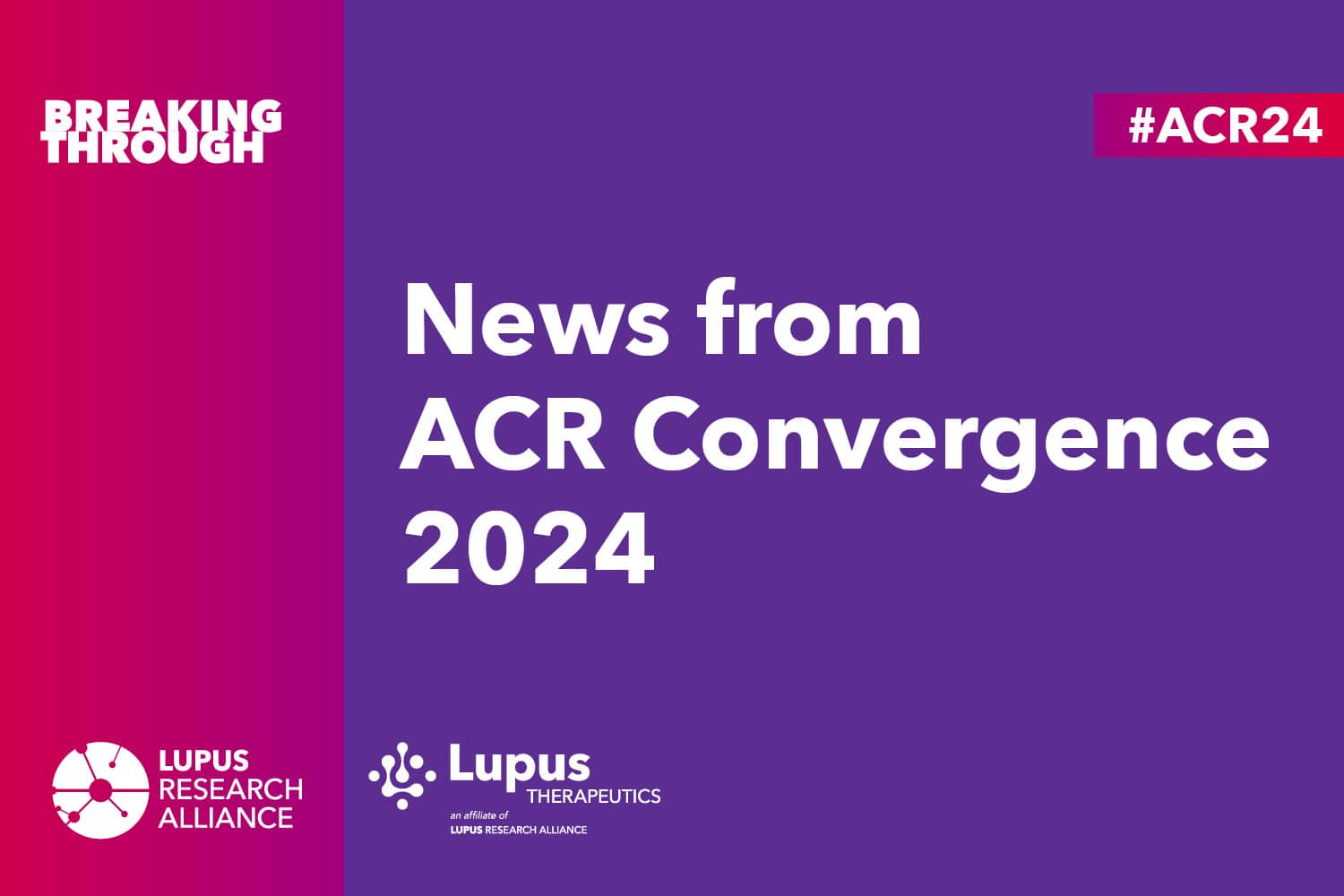LRA Applauds Exciting Lupus Research Being Presented at 2019 ACR/ARP Annual Meeting

LRA Applauds Exciting Lupus Research Being Presented at 2019 ACR/ARP Annual Meeting
- Includes 16 presentations of studies funded by the Lupus Research Alliance on a variety of immune pathways
- Results from two clinical studies conducted by LRA-affiliate Lupus Therapeutics (LT) in collaboration with Rilite Foundation and Pfizer to be presented
- Extensive positive studies focused on lupus, including successful Phase 3 and Phase 2 clinical and mechanistic data
- 100+ LRA- and LT-affiliated researchers presenting at ACR
NEW YORK, NY, November 6 — The Lupus Research Alliance (LRA), the largest private funder of lupus research in the world, announced today that 16 studies supported by the organization will be presented at the 2019 ACR/ARP Annual Meeting November 8-13, 2019. In addition, results of two positive clinical studies conducted by LRA’s affiliate Lupus Therapeutics (LT) in collaboration with Pfizer Inc and the Rilite Foundation focus on improving how lupus disease activity is monitored. The volume of lupus-related abstracts at the meeting includes several highly anticipated studies related to anifrolumab, obinutuzumab, ustekinumab, itolizumab, and belimumab.
“This meeting marks an exciting time for lupus research and of hope for the community,” said LRA President and CEO Kenneth M. Farber. “The research work we have been funding and supporting is now bearing fruit, with results uncovering key insights about what causes lupus and affirming directions for potential new treatments. Also exciting, this meeting will showcase promising results of trials testing drugs that have grown out of our foundational research, bringing the very real possibility of much-needed new treatments for lupus in the offing.”
Foundational Research Identifies New Pathways, Insight on Lupus Nephritis Progression
The Lupus Research Alliance has invested more than $200 million in lupus research programs through nearly 500 studies and more recently the Lupus Clinical Investigators Network (LuCIN) of 57 academic sites administered by Lupus Therapeutics. LRA-funded researchers have contributed to the identification and validation of more than 15 different disease pathways in lupus that are currently targeted by more than a dozen therapeutic approaches.
At ACR, LRA-funded investigators will be presenting novel research uncovering key insights about the various types of immune cells involved in promoting different aspects of lupus. Several presentations will focus specifically on research geared to understand how lupus affects the kidneys (lupus nephritis) — from how the molecular profile of kidney cells change during the course of lupus nephritis to how a drug could prevent certain immune cells from entering the kidney and causing damage.
Sunday, November 10
Poster: The Single-cell Transcriptomic Landscape of NZB/W Murine Lupus at Early and Late Stages of Disease. Abstract #0072, Hall B5, 9:00am
Poster: A Novel Method to Analyze Circulating Immune Complexes Predicts Disease Activity and Severity in Systemic Lupus Erythematosus and Rheumatoid Arthritis. Abstract #0641, Hall B5, 9:00am
Poster: Transcription Factor Fli-1 Impacts Lupus Nephritis by Orchestrating CXCL10/CXCR3 Axis. Abstract #0017, Hall B5, 9:00am
Poster: Lyn-Deficient Murine Lupus Is Exacerbated by Glucocorticoid-Induced Leucine Zipper (GILZ) Deficiency. Abstract #0061, Hall B5, 9:00am
Monday, November 11
Poster: Lysosome Defects in SLE Promote the Accumulation of Nuclear Antigens on the Surface of Hematopoietic Cells. Abstract #1024, Hall B5, 9:00am
Poster: Decreased Nocturnal Blood Pressure Dipping in Patients with Systemic Lupus Erythematosus: Association with Markers of Inflammation. Abstract #1561, Hall B5, 9:00am
Oral: Reversible Dysregulation of Renal Circadian Rhythm in Lupus Nephritis. Abstract #1783, B403, 2:30pm
Oral: A Human SLE Variant NCF1-R90H Drives Lupus-like Kidney Disease in a Pristane-induced Murine Lupus Model. Abstract #1782, B403, 3:00pm
Oral: Clinical Implications of Neutrophil Extracellular Traps in Systemic Lupus Erythematosus. Abstract #1827, Sidney Marcus Auditorium, 3:15pm
Oral: The Glucocorticoid-Induced Protein GILZ Represent a Checkpoint in the IFN Program in SLE. Abstract #1787, B401, 3:45pm
Oral: Reduced DNASE1L3 Activity in Sporadic SLE Is Linked to Increased DNA Load of Microparticles, Reactivity to DNASE1L3-sensitive Antigens, and Lupus Nephritis. Abstract #1916, B405/B407, 5:00pm
Tuesday, November 12
Poster: Pleiotropy of Systemic LupusEerythematosus (SLE) Risk Alleles: Association With Increased Risk for Type 1 Diabetes (T1D) Complications through a PTPN22 Polymorphism. Abstract #1959, Hall B5, 9:00am
Oral: Inhibition of Neutrophil Elastase Reduces Autoantibody Levels and Renal Inflammation in Murine Lupus. Abstract #2733, A302, 2:30-3:00pm
Oral: The Transcription Factor MAF Controls the Ability of T Peripheral Helper (Tph) Cells to Help B Cells. Abstract #2819, A311, 5:15pm
Oral: Lower IL-4R in IgD+ Naïve B Cells Is a Pre-disposing Factor for Development of T-bet+ DN2 B Cells in Systemic Lupus Erythematosus. Abstract #2815, B309, 5:45pm
Wednesday, November 13
Oral: CD6-ALCAM Signaling Is Upregulated in Kidneys with Lupus Nephritis and Is Associated with Disease Activity. Abstract #2894, B304/305, 11:00am
Studies Validate Novel Assessment Tools
Lupus Therapeutics, an affiliate of LRA, focuses on accelerating testing of potential new treatments and improved ways to diagnose and monitor the effects of lupus. The organization oversees the Lupus Clinical Investigators Network (LuCIN) composed of 57 of the top research medical centers in North America. Two studies conducted through LuCIN that promise to improve disease monitoring will be presented at ACR.
Sunday, November 10
Poster: Utility of a Mobile Phone Based Application to Collect Patient-Reported Outcome Information from People Living with Systemic Lupus Erythematosus, Abstract #662, Hall B5, 9:00-11:00am
Collaborator: Pfizer Inc
Monday, November 11
Oral: Development of a Multi-Modality Imaging Approach to Evaluate Lupus Nephritis Abstract #1919, 5:45pm, B405/B407
Collaborator: RILITE Foundation
Community Involvement Accelerates Results
LRA and LT aim to unite all sectors of the lupus community to pursue one goal – better treatments and a cure. An LRA-sponsored Patient Perspectives Poster PP07 Sunday, November 10 at 11:30 tells the lupus patient story to professionals, illustrating why their research is so urgently needed. Please visit the Lupus Research Alliance/Lupus Therapeutics BREAKING THROUGH TOGETHER Booth # 1151 (across from AbbVie #841) to learn about the many ways researchers, healthcare professionals, industry, people with lupus and family members can work collaboratively to accelerate clinical trial participation in lupus and drug discovery.
About Lupus
Lupus is a chronic, complex autoimmune disease that affects millions of people worldwide. More than 90% of people with lupus are women; lupus most often strikes during the childbearing years of 15-45. African Americans, Latinx, Asians and Native Americans are two to three times at greater risk than Caucasians. In lupus, the immune system, which is designed to protect against infection, creates antibodies that can attack any part of the body including the kidneys, brain, heart, lungs, blood, skin, and joints.
About the Lupus Research Alliance
The Lupus Research Alliance aims to transform treatment while advancing toward a cure by funding the most innovative lupus research in the world. The organization’s stringent peer review grant process fosters diverse scientific talent who are driving discovery toward better diagnostics, improved treatments and ultimately a cure for lupus. Because the Lupus Research Alliance’s Board of Directors fund all administrative and fundraising costs, 100% of all donations goes to support lupus research programs.
About Lupus Therapeutics
Lupus Therapeutics, an affiliate of the Lupus Research Alliance, aims to accelerate drug discovery and diagnostic innovation for all patients living with lupus. Lupus Therapeutics engages with biotechnology and pharmaceutical industry, as well as other investigators, to bring clinical trials to real people living with lupus. The organization places the patient voice at the center of strategic planning with the most creative clinicians and scientists in the world.
For interview requests contact:
Tara DiMilia
Direct: 908-369-7168
Mobile: 908-884-7024
Tara.dimilia@tmstrat.com
Margy Meislin
MMeislin@LupusResearch.org



